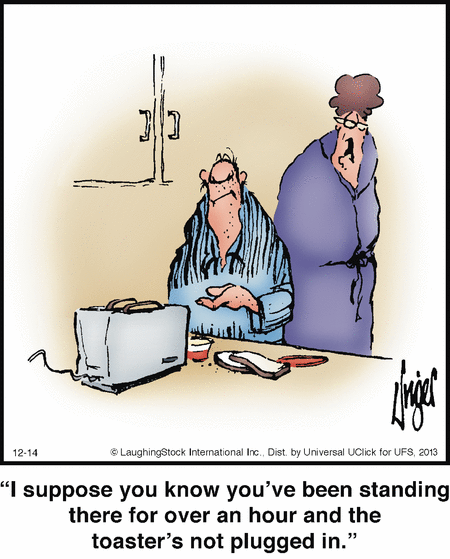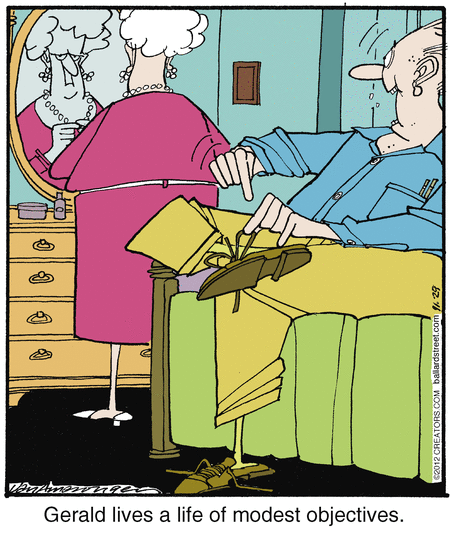December 21, 2013 – Saturday’s Smile




December 21, 2013 – Saturday’s Smile Read More »
Podcast: Play in new window | Download (Duration: 41:11 — 38.1MB)
Subscribe: Apple Podcasts | Spotify | RSS | More

I don’t view business-building success like most. Jim Collins, famed business author of “Good to Great: Why Some Companies Make the Leap…And Others Don’t” gave people the metaphor I hear almost weekly.
Put the right people on the bus in the right seat and you’ll achieve success.
No, you won’t. You’ll end up chasing your tail looking for better people and before long, you won’t even be able to find the bus, much less the right people to put on the bus.
It’s a colossal excuse-making vehicle. That’s what the bus represents. Visit any CEO and within minutes, if the conversation is about constraints, challenges and hurdles, you’ll hear complaints about people. The problems are almost always people.
Internal people are the problem. Employees.
External people are the problem. Suppliers. Financial partners. Vendors.
Other external people are the problem. Prospects. Customers.
Every business owner I’ve ever known could have a more successful business if only they could get better people.
It’s a never-ending story. And it’s not because people suck. Well, okay, some of them do, but that’s not the issue. The real issue is that too many business owners are focused on the wrong things.
I’m fanatical about remarkable client experiences, but that’s the output, the result of putting first things first.
“I don’t care about that stuff,” he says. “I want customers. I want more business.”
He’s got the cart before the horse. If he’s focused solely on getting new business then he’s doomed to fail…eventually.
His employees won’t be engaged. His existing clients won’t find the experience remarkable. His referrals won’t be positive. I’ve seen it happen dozens of times with businesses that otherwise could have achieved extraordinary success. They erode their client base. Like the foundation of your house, if it crumbles, then it won’t be long before the roof caves in.
In my freshmen year of high school, having played football since I was in elementary school, we arrived at summer practice, a few weeks before school started. Dressed in workout clothes and sneakers an assistant coach lined us up and began his big speech, “Here at Southwood we use the 3-point stance.” He instructed us to get into a 3-point stance. We’d all known this since the 4th grade. I played along.
“The way you take a man’s head, that’s the way his body will go,” said the coach. I smiled. Big mistake. “You think that’s funny, Cantrell,” he said. Never one to let a snarky opportunity pass, I tried to resist, but couldn’t. I replied, “Yes sir, kinda.”
He ordered me down in a 3-point stance. I obeyed. He stood over me and held my head down. “Try to raise up,” he barked. Of course, I couldn’t. Nor could I resist to tell him that holding wasn’t allowed and that I’d battle and knock my opponent to the ground if they ever attempted to hold me.
He wasn’t amused. I was. As were my teammates. But the lesson was never lost on me, the body follows the head.
Businesses follow their leaders. Grass roots efforts are almost never positive. I’ve seen insurrection rise up from the grass roots. I’ve never personally seen a business built into a success from the grass roots. Without intervention, weeds come up more easily than grass.
That’s why all my work starts with the head and getting the foundational principles established.
I’ve learned the hard way that when the leaders of a company don’t have proper focus on dazzling their clients, then I can’t help them.
I never assume there’s a devotion to spectacular client or customer experiences. Talk is cheap and everybody talks a good game. Very, very few make good on it because when push comes to shove, superior experiences for clients get pushed aside for something else…usually a short-term profit margin.
Here’s THE SECRET. Okay, it’s not really a secret, but you’d think it is given how few people incorporate it into their business. It’s a question.
What one thing can we do for our customers that nobody else can (or will) do for them?
About 20 years ago a friend who worked for GE invited me to join a small group of Dallas business people to meet and greet GE Chairman Jack Welch. He knew I was a big fan of Welch, even though many people reviled him as Neutron Jack.
He spoke to us briefly, and then opened the floor for questions. Herb Kelleher, then Chairman of Southwest Airlines, was present and asked, “What is GE’s strategic planning?” Being an avid reader about Welch I knew the answer, but the 5-foot nothing New Englander answered with his usual blunt flare.
“We don’t have strategic planning at GE. We just ask two questions. What can our competitors do to nail us to the wall in the next 18 months? And, what can we do to jump over them and nail them to the wall in the next 18 months? That’s our strategic planning.”
For Welch, things were pretty cut and dried. If you weren’t number 1 or 2 in market share, then you had no purpose for existing. He earned the nickname Neutron Jack because he would jettison entire companies or divisions, but leave the buildings standing. Downsized people, including executives, hated him, but by most accounts, he always warned divisional or company leaders that they were on the auction or chopping block. Welch didn’t suffer fools or market laggards.
Business building is about making up your mind. It’s about determination. It’s about fixing on what matters the most.
It’s not about WHO.
It’s about WHAT.
Systems, processes and workflow. Those are the things that can best build successful businesses. They remove excuses. They either work or they don’t. They either work well, or they don’t. They’re measurable. They remove hiding places.
That’s why most companies don’t operate that way. They’d rather spend their days asking, “Who did that?” as they look for penning the fault on somebody.
It’s easier to move people around than to do the heavy lifting of putting systems in place. It takes a lot of hard work to architect a system – whether it’s marketing or management or client follow-up – that produces predictable results over and over again.
Typically two groups of businesses have had to produce stellar results and they appear to have nothing in common: airline pilots and fast food counter help. One group is highly skilled and high compensated. The other earn minimum wage.
Both are considered failures if they only get it right 99% of the time. Pilots can kill people if they fail. Customers yell at fast food clerks if they get orders wrong. But mostly, both groups get it right because both groups work with advanced systems and processes that provide predictable success every single time.
One special person who happens to “get it” can be an outlier and perform killer business results. Like finding a four-leap clover, it can happen, but the odds aren’t favorable.
Or, systems and processes can be built that will provide predictable results every single time without fail.
Focus. Concentrate.
Without them we’re aimless. Meandering. No direction. The principle element of focus is answering the question, “Where is our place?”
Of you and your business, “Where is your place in the market?”
What’s the most important thing to you and your business?
What are your convictions — the things that drive you?
Select. Discriminate.
If everything is important, then nothing is important. You’ve got to pick and choose where you’re going to put your efforts. If you don’t, you’re going to be riddled with daily chaos. “We’re chasing our tail,” is the common refrain borne by business owners who fail to establish the priorities of proper business building.
Organize. Set up.
This is where some real heavy lifting happens. Or not. Again, walk into visit most CEO’s and ask them if they’ve got systems, processes and workflows documented and they’ll respond by telling you about job descriptions.
Nope. Not the same thing.
A job description is just a meaningless document faking it as an accountability tool. It’s an HR device, not a business-building tool. It’s a tool to beat a poor worker over the head with before we fire them.
A process is a detailed, step-by-step direction telling people what they must do, how they must do it and what result they’ll get when they do. In the hands of worker A, or worker B, or worker C — the same result is achieved if the process has been properly crafted.
Improve. Innovate.
Nothing stays ideal forever. Nothing stays fixed forever. Things change. Constraints crop up. Hurdles present themselves.
The Marines famously say, “Improvise, adapt and overcome.” We have to do that in our businesses. We can’t stand pat on our systems. That doesn’t mean we deconstruct them constantly, but we do have to revise them and make improvements.
Being dissatisfied is a quality that drives every successful business. Complacency is a killer.
Connect. Communicate.
There are no results unless there’s effective communication. No process, whether it’s marketing, selling, consulting, advising, answering, asking, telling, educating, inspiring, entertaining or correcting happens without it.
Connections and communication are often inadequate, non-existent or unclear. The result is lost sales, unhappy clients, tense situations, unhappy employees and elevated frustration.
When we touch people with effective communication it stands out and solidifies relationships. It’s how we determine who we like and who we hate.
Conclusion
Servant leadership means removing the obstacles that prevent people from delivering predictable success time and time again. It means giving people – all your people – the best chance for success. That means you provide clear instructions and great systems that serve them and your customers.

199 Servant Leadership: Is There Really Any Other Kind? Read More »
Podcast: Play in new window | Download (Duration: 36:34 — 33.9MB)
Subscribe: Apple Podcasts | Spotify | RSS | More

You hear it pretty regularly. An entrepreneur tells the horror story of their humble beginnings. They had no money and no investors. So they apply for as many credit cards as they can and max them all out. Whether it’s hundreds or thousands, it’s runway they need to get up to speed so they can get liftoff and gain some altitude.
The success stories are thrilling. We listen with anticipation, thinking to ourselves, “How scary! I can’t imagine living like that.”
But when we hear how they came through it, paid off all the cards and gained traction to be wildly successful — well, maybe that’s not a bad strategy after all. (Yes, it is.)
Cash flow – or more appropriately, a lack of cash flow – kills as many businesses as anything else.
It’s a systemic problem, but it can be so powerfully worrisome that we forget the reasons why we’re out of cash. Sometimes it makes a fella do something unethical, or even illegal. Sometimes, it drives a gal to drink. I’ve seen some pretty crazy behavior tied to a lack of cash flow. It can bring out the worst in people.
Desperation. Panic. Those are sure to distract the most disciplined business person.
Talk with any cancer patient and they’ll confess that one of the things they hate most is how all consuming it is. It takes over their life. It dominates all conversations. It’s the elephant in the room that you just can’t kill. Cash flow problems are the cancer of business building.
Today’s show is an answer to a recent question – an all too common question:
My company is experiencing a severe cash crunch. We need to take fast action. What should we do?”

Episode 198 – No Cash, No Customers, No Hope Read More »
Podcast: Play in new window | Download (Duration: 31:45 — 29.5MB)
Subscribe: Apple Podcasts | Spotify | RSS | More
60 Minutes Sports just did a segment on sled hockey, that version of ice hockey played by disabled people who strap themselves onto a sled with two blades underneath. The game is fast and physical. Just like regular ice hockey.
Part of the segment was about men who returned from war torn regions of the world with severe disabilities. One young in particular had lost both legs to a road side bombing. As he recounted the day of his injuries he told the reporter he knew he had been badly hurt. When he discovered that he had lost both legs he said he wondered about a lot of things. “I wondered if I’d ever be able to do this or that,” he said.
But then he said something that hit me unlike anything has hit me in a long time.
It was pretty tough there for a couple of months.”
I stared at the TV screen and thought, “A couple of months?”
He didn’t appear to be any older than 25. I watched his facial expression as he talked and realized – he’s serious!
This young man is serious about how it was a tough couple of months. He loses both legs, gets fitted with prosthetic limbs, has to learn to walk all over again and he characterizes it as “a tough couple of months.”
I can suffer a setback and be on my heels for 6. Shoot, I’ve had some setbacks that lingered well over a year and no limbs were lost. I haven’t even had a broken bone in my life, but I can get knocked down and dragged out with the best of them.
And don’t I feel stupid, ashamed and weak now?
Of course I do. Don’t you?

Episode 197 – Lessons Learned From A Casual Comment By A Very Wounded Veteran Read More »